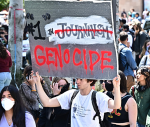You are here
The only way forward
Sep 04,2014 - Last updated at Sep 04,2014
Three and a half years ago, the “Arab Spring” started on a very positive note and yielded some immediate positive results.
Violence and external interference, however, transformed it from a potential blessing into a curse.
We all remember how the January 2011 and successive events happened. Millions of citizens took to the street in several Arab countries, demonstrating peacefully and demanding freedom and a better life.
Representatives of those spontaneous uprisings, mainly cultured young people, were exemplary in their conduct and correct in their demands.
It was a civil rights movement at its best, faithfully adopting the principle of civil-disobedience and strictly adhering to non-violence, reminiscent of the grand civil movements of Gandhi in India and Martin Luther King in America.
Those of us who were watching events closely felt proud, cheerful and hopeful. The authoritarian regimes in Tunisia, Egypt and Yemen fell successively due to this admirably civil, non-violent popular pressure.
Finally, change had come to the Arab world, and it was being brought about in the right way: civilly and responsibly.
Soon, however, the uprisings began to be hijacked and things started taking a very negative, ominous, turn.
The disastrous turning point, I distinctly remember, was Libya.
All of a sudden, instead of the peaceful sit-ins and the disciplined demonstrations we witnessed in Tunisia, Egypt, Yemen and even Libya itself, we started seeing in Libya shabby men in pick-up trucks loaded with guns shooting and fighting.
“Who are these people? Where have they come from? Where did they get their guns? Who is leading them?” were the questions asked.
This was the moment one felt the short-lived Arab Spring would not last for long.
The last thing one wanted in the height of the euphoria and success of the peaceful revolutions was militarism, blood, violence and chaos.
Soon Syria followed suit. Chaos, violence, death and destruction multiplied and prevailed.
Now, with hindsight, we know what happened.
Several things happened, obviously, but the main negative and disastrous development was external interference.
Foolishly and disastrously, some Arab countries started interfering in the affairs of other Arab countries, supplying the so-called opposition with funds, weapons and “fighters”.
Other neighbouring countries with greed and agendas of their own — such as Turkey, Iran and Israel — chipped in, facilitating, supporting and contributing to the bloodshed and chaos in the name of freedom and democracy.
And when one speaks of “freedom” and “democracy”, one must also expect Western powers to be present, of course.
The same imperial Western powers that had colonised and oppressed our part of the world for decades have now become the patrons and providers of our freedom and our democracy!
The point here is not that one did not want the dictatorial, oppressive regimes to go. They had — and have — to go. Oppressors must go.
The point, rather, is that they have to go through non-violent means, through the same disciplined, responsible uprisings that took place early on and toppled gigantic dictators, but not with guns, bloodshed and chaos, whose culmination now is the Islamic State, or Daesh.
It is not too late for Arab countries and their allies from the region and abroad to learn from the mistakes and help the Arab world rise from the ashes.
The downfall can be reversed. But any attempts at reversing the downfall and the destruction should take into account the following: the so-called opposition in the Arab world does not represent the people (some parties represent some minor segments, but there are no major parties with wide grassroots yet); the opposition should not be supplied with arms, for militarism breeds militarism and violence breeds violence; there should be no interference in the affairs of any individual Arab country either by Arab countries or by others.
These are all fundamental principles that we have learned from past and recent events.
Tellingly, the only Arab country which has the potential to succeed is the one in which neither the old regime nor the opposition hijacked the revolution, in which the revolution has not been turned bloody, and which has not been exposed to external interference: Tunisia.
The only way forward for both the Arab Spring countries and others is for people’s demands to be met. And the only way for these demands to be met is through no violence and no external interference.
Any violation of these basic principles serves only the interests of the extremists, terrorists, imperialists and old oppressive regimes against which the people rose.













